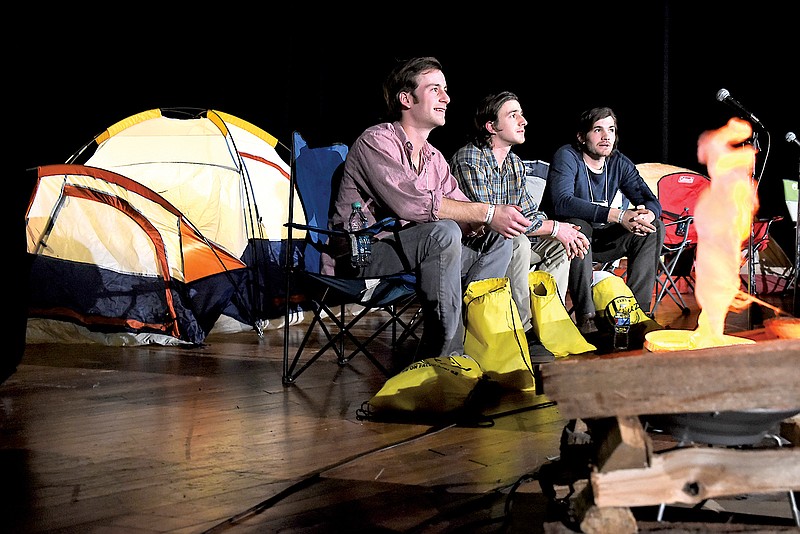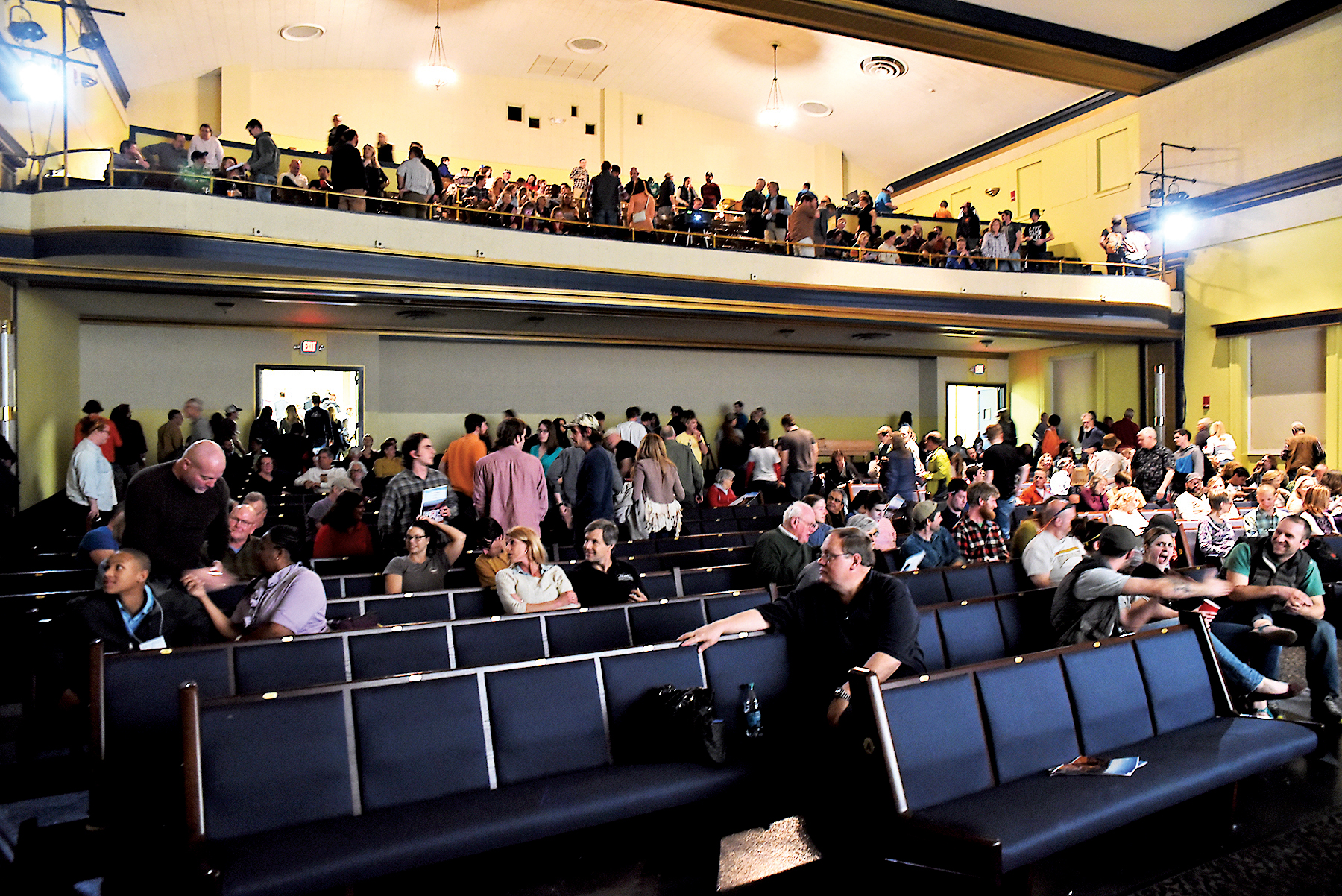State and local film resources
Alabama Film Office The Backlot: A Place for Filmmakers Georgia Film and TV Production Tennessee Film, Entertainment & Music Commission
You probably have a video on your phone right now that you're proud of, one that you think should be on television or even the big screen. A setting sun over the mountains. A rippling brook glistening in the moonlight.
Or maybe it's a cat falling off a windowsill.
Technological advances have made it much easier for almost anyone to create a watchable, even professional-looking video. But there is a difference between capturing a flower blowing in the wind and producing a movie with a captivating story, good directing, compelling characters and enough conflict to hold a viewer's interest.
"Technology makes it easier, but it does force you to be more creative and find real stories to tell," says Jordan Berger, co-founder along with Gavin Fields, Houston Settle and Daniel Russell of Deer Run Media.
"It used to be that film festivals looked for stuff that was well shot and looks professional. Now, everything looks professional."
And there's still the issue of financing your projects.
Chattanooga would appear to be at the beginning of a movement to become a film-loving community. The Lookout Wild Film Festival, which celebrates extreme sports and the people who film them, was held here for the third year two weeks ago, and the Chattanooga Film Festival, in its second year, wraps up today. It features all genres of movies. Both have seen growth in the number of films shown and the number of ticket buyers.
The Broad Street Film Festival for locally produced and student films returns April 18-19 to the Majestic 12 downtown. The Chattanooga Jewish Film series begins its eighth annual run April 22. The past couple of years also have seen mini-festivals featuring children's films and animé.
Several area colleges have ramped up their film, acting and production curriculums as well.
Independent filmmakers and production companies such as Fancy Rhino, Brandywine Productions and Deer Run have also located here in the last couple of years. They've come here in part because of the resources available and in part because technological improvements in filmmaking software and equipment have made it cheaper to make a movie from anywhere in the country.
Deer Run is located in a three-room office on Williams Street off Main Street. It is an open, exposed-brick affair with a big table in the middle of the largest room. The four filmmakers all work on Apple laptops using primarily Logic Pro X and Adobe's Creative Suite software, which gives them the ability to edit not only the clips they shoot together but to control color saturation, edit photographs and more than a dozen other options.
Their four Canon DSLR cameras have all been hacked with Magic Lantern to allow them to record at an even higher quality.
"That is a game changer," Russell says. "It looks more professional."
It's all a far cry from how things worked when Bobby Stone started in the business.
"When we started, it was really hard," says Stone, who recently retired from Atomic Films, which he co-founded a quarter century ago. Over the years, Atomic has produced commercials, marketing and training films and documentaries that have been screened at film festivals.
"When we started, film was $200 a roll and really slow, so you had to use lots of light, which meant having lots of people to carry them and trucks [to power them]. Now, it's [digital video technology] so sensitive most of these people don't even use [artificial] lights."
And filmmakers - amateur and professional - find more than enough natural beauty and resources in our area to make nearly any project work. From working trains to urban settings to mountains, lakes, rivers, creeks, open spaces and plush forests, the area has it all.
But there are hurdles.
"The challenges are, if you are trying to make narrative films, the business isn't really in a place like Chattanooga," Stone says. "It's in New York or LA."
Since retiring, Stone has been closely involved in the Capture Project, which asks amateurs and professionals to capture three minutes of video showcasing the natural beauty of the area or the ways people enjoy it. The clips are then edited into longer films and shown to the public as a fundraiser for the Association for Visual Arts.
"Every year, some of my favorite shots are something someone off the street did with their phone," he says.
But capturing that shot doesn't make you the next Spielberg.
"Just having a movie camera before didn't make you a good filmmaker either," Stone points out.
The four mid-20-somethings at Deer Run met while in film school at the University of Mississippi. Both Berger and Settle attended David Brainerd Baptist School here and started their production company in Chattanooga in June because of the resources they believe are here.
"It's not an overfarmed area," Settle says. "The certain projects that are being done here have not been done here before."
"Right, and because of that, people are hungry for films to be shot here," Berger adds.
"We experienced a similar thing in Oxford [Mississippi] with people's willingness to help out," Settle says. "They think it's neat that you are making a movie."
Film History
The last Hollywood film to be shot here was "42," the Jackie Robinson biopic that was filmed in large part at Engel Stadium in 2012, but there have been several others. "Leatherheads," starring George Clooney, was partially shot in the area, as was "Water for Elephants" with Reese Witherspoon and Robert Pattinson.
Those films had Hollywood and money behind them. Filmmakers like the guys at Deer Run and independents like Zachary Ratchford and his Brandywine Productions do not. They've found that while people here might be willing to give of their time, they are less likely to give their money.
Since starting the company in June, Deer Run has done primarily commercial work, though they did shoot a short film, "The Surface," while at Ole Miss and a music video for local musician Kip Bradley. Both projects were shown at the Chattanooga Film Festival: "The Surface" last year, Bradley's video this year. They also did a short documentary about local Ironman competitor Jackson Wingfield that was screened at this year's Lookout Wild Film Fest.
"We've been polishing ideas doing the commercial work to pay the bills, but definitely in the next year we want to make a short or a feature," Russell says.
Ratchford has been working on his film "Faye 1984" for about a year. It was originally intended to be feature length, but budget constraints and personal issues that altered his viewpoint of the film's focus caused him to scale it back to a 10-minute short.
As an independent filmmaker, he has had to find creative ways to film the project. That often means enlisting friends, neighbors and anyone else willing to help to do everything from be on-screen to run camera.
The good news is that, for the most part, people around here are happy to volunteer their time. Most of the 10 actors used in the short have some acting experience, he says. Only Trey Cook, the film's editor, is getting paid for the work.
Ratchford and the guys at Deer Run say they have to keep realities of budget and manpower in mind when writing and conceiving a film.
"I have a list of plays and movies I want to do but that I can't touch now because they are big budget," Ratchford says.
Settle says he and his colleagues are aware of their limitations when writing a film, but their projects don't tend to require expensive sets, computer-generated images or large casts.
"You have to be innovative," he says. "I think our style has a lot to do with it. We've never felt like, 'Man, we can't do this.' We do write realistically based on the money we have and the resources we have."
"The Surface" was shot in the pool at Ole Miss with the lights out to give the illusion of being on a vast body of water.
"We rely heavily on performances," Berger says.
A Film Resource
While the local film community seems to be growing, the individuals involved aren't always aware of the existence of others. That's something Chris Holley, manager of the city's Heritage House in East Brainerd and a liaison for the Chattanooga Southeast Tennessee Film Commission, is trying to fix.
About three years ago, she combined her job with her passion for film and created Backlot, billed as "a place for filmmakers." She figured out a way to make Heritage House available for groups who didn't want to tie up a restaurant table for several hours to meet.
Each third Monday of the month, Heritage House opens its doors to everyone interested in the moviemaking process. During a Backlot session, writers seeking help on a script, casting directors looking for actors or actors looking for roles can show up.
Each Backlot event might have casting calls going on in one room and a table reading in another. It's open to new filmmakers and those with experience who want to share their knowledge. The Backlot Facebook page shares info about casting calls or other job opportunities.
"Some are here for the first time working on their very first project, and some have worked together for years," Holley says.
She says the gatherings are designed to be an all-encompassing resource, but they often go underutilized by area filmmakers simply because "most of them don't know about each other."
There are no dues and there is no formal governing body because, Holley says, Backlot is designed to be open and beneficial to all.
"We do not want to homogenize art. You let it grow in all kinds of crazy directions. We try to cross-pollinate and let them know about each other."
Guest speakers have discussed everything from sound editing to sound and lighting techniques. Holley emphasizes that the topics cross all types of film.
"Sound editing and color saturation tips all work on all genres."
The Chattanooga area is populated by people who have either worked in or are still working in all areas of film and television. The Tennessee Music, Entertainment & Film Commission keeps a database of contact information for everyone from carpenters to seamstresses to painters and actors with set experience. Georgia and Alabama have similar resources.
Holley says the film community here is definitely on the upswing, and the opportunities are great.
"The key is letting everyone know about them and about each other."
Russell believes Chattanooga is good place to make films.
"I do feel like a filmmaker can make it here. It's about less where you are and about what you are making."
Houston agrees.
"What makes a good filmmaker is having a vision and completing it regardless of resources and equipment and having the film shine."
Contact Barry Courter at bcourter@timesfree press.com or 423-757-6354.

